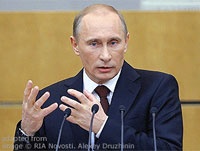If Putin Wins Presidency, He Will Have to Govern in Different Way - Political Analyst
Interfax - 2.29.12 - JRL 2012-37
MOSCOW. Feb 29 (Interfax) - If Vladimir Putin wins the presidential election, he will have to build coalitions or alliances to govern the country efficiently, says Gleb Pavlovsky, the head of Efficient Policy Foundation.

"The problem is that we had a kind of monarchy for ten years, which was based on one person's charisma. This person is now returning to central power, but without the previous charisma, and therefore everything will be very different," Pavlovsky told journalists on the sidelines of Putin's meeting with his campaign staff members and Popular Front members on Wednesday.
Putin "will have to somehow restrict himself and build some alliances and coalitions, or otherwise he will find it hard to govern."
Putin no longer enjoys charisma that enabled him to govern on his own for the first two presidential terms, Pavlovsky said. "Everything comes and goes, and there is nothing eternal in politics," he said.
Nevertheless, Pavlovsky is of the view that Putin will win in the first round of the voting. "Since a political decision has been made that there will be no (second round), I think there will be none," he said.
Asked whether Putin could run for president again in six years, Pavlovsky replied, "I don't know how the first term will go, and therefore I think it would be absurd to discuss the second one."
In commenting on rumors that Putin "will come not for long," Pavlovsky described them as a reaction to "the recent shocks."
As for incumbent President Dmitry Medvedev's prospects after the elections, Pavlovsky shared the common belief that Medvedev will be prime minister at least for some time. "I think he will be the prime minister under Putin for some time. In the beginning. It is difficult to say for how long. This depends on how they can work together, because it is obvious that they have quite different views on things and different political views," Pavlovsky said.
Keywords: Russia, Politics - Russia News - Russia
MOSCOW. Feb 29 (Interfax) - Russian Prime Minister Vladimir Putin has set the task to resolve the poverty problem, to considerably increase wages, and to create new jobs by 2020.
MOSCOW. Feb 29 (Interfax) - If Vladimir Putin wins the presidential election, he will have to build coalitions or alliances to govern the country efficiently, says Gleb Pavlovsky, the head of Efficient Policy Foundation.

"The problem is that we had a kind of monarchy for ten years, which was based on one person's charisma. This person is now returning to central power, but without the previous charisma, and therefore everything will be very different," Pavlovsky told journalists on the sidelines of Putin's meeting with his campaign staff members and Popular Front members on Wednesday.
Putin "will have to somehow restrict himself and build some alliances and coalitions, or otherwise he will find it hard to govern."
Putin no longer enjoys charisma that enabled him to govern on his own for the first two presidential terms, Pavlovsky said. "Everything comes and goes, and there is nothing eternal in politics," he said.
Nevertheless, Pavlovsky is of the view that Putin will win in the first round of the voting. "Since a political decision has been made that there will be no (second round), I think there will be none," he said.
Asked whether Putin could run for president again in six years, Pavlovsky replied, "I don't know how the first term will go, and therefore I think it would be absurd to discuss the second one."
In commenting on rumors that Putin "will come not for long," Pavlovsky described them as a reaction to "the recent shocks."
As for incumbent President Dmitry Medvedev's prospects after the elections, Pavlovsky shared the common belief that Medvedev will be prime minister at least for some time. "I think he will be the prime minister under Putin for some time. In the beginning. It is difficult to say for how long. This depends on how they can work together, because it is obvious that they have quite different views on things and different political views," Pavlovsky said.